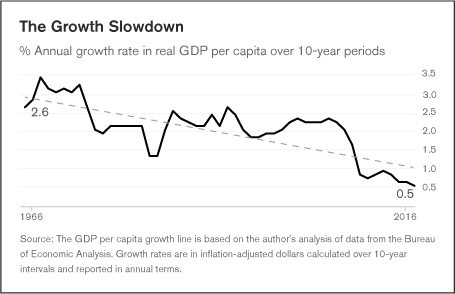
Originally Posted by
Kirkland Laing


Originally Posted by
TitoFan


Originally Posted by
Kirkland Laing


Originally Posted by
TitoFan


Originally Posted by
Kirkland Laing

And yes, unions I say. Reagan smashing the unions is the reason wages have been stagnant since he took office. The lack of union power is the reason for the unchecked deregulation and tax cuts that have blown the national debt, inequality and the deficit, wrecked middle class incomes, the 2008 economic meltdown and more. It's the worst thing that has happened to America in the last century.
Again I'll insert the disclaimer that I'm no expert on unions..... but I'll mention the air traffic controllers strike of 1981. After Reagan fired them all, it got a little dicey there for awhile. PATCO probably thought they were irreplaceable. Yet somehow Reagan got them all replaced and after limping along a little bit with a makeshift force largely made up of Navy controllers and other such sources, the system quickly got back on track and PATCO learned a hard lesson.
I'm not a fan of unions myself, having had experience with them in the work environment. Maybe their origin was needed and well overdue. But like everything else that is created to right a wrong, many times the pendulum swings too far to the other side, creating totally new problems. I'm not gonna claim they're all bad... but certainly some unions have outlived their usefulness and should've probably morphed into something else a long time ago.
Back when unions had real political power in America wages kept pace with national income/productivity growth. Since unions have been neutered a back of the envelope calculation says it's cost the median earner twenty thousand dollars a year in income which now stays in their bosses' pockets. That's one point six million in income that the median household has lost in the forty years since Reagan smashed the unions. How many American households, were they to know the facts of the matter, would say you know what these guys are definitely no use at all, who needs an extra one point six million (not incuding benefits like healthcare, pensions, paid holidays/sickleave/maternity/paternity leave etc etc). These unions have clearly outlived their usefulness and should have morphed into sewing circles or cycling clubs.
If the pendulum has swung too far to the other side maybe it's swung too far to the side of capital away from labour? Certainly the entirety of the last forty years of economic numbers would suggest this is the case. I can feel a graph coming on. I'm going to dig a graph up.
You steadfastly mention the wages, for which I have no data to counter with. But you ignore the productivity side of the equation, and certainly did not mention anything on that air traffic controller strike which Reagan ended rather quickly. From personal experience, let me tell you the frustration a manager/supervisor feels when he asks a unionized worker to tighten the leaking universal union on the compressed air line, only to be countered with "I only loosen universal unions... I don't tighten them. You need to get a Class 2 Division B Millwright." I personally witnessed at some point in my life the sight of unionized workers lounging around refusing to do work they were perfectly capable of doing, with the only reason being that their collective agreement didn't allow them to do so. As a young, hands-on person, I learned the hard way that you can't do a unionized person's job for them, either. That's like opening a free can of shit, resulting in wasted time and money while grievances are being heard.
Sorry....... not a union fan.
One strike is kinda meaningless compared to the whole Reagan era anti union regulation/legislation. It's another example of powerful interests smashing workers though ultimately creating powerless workers working for what they're told they can have rather than them being able to negotiate their fair share of increasing national income. And as far as anecdotes go, the plural of anecdote is not data. As far as productivity goes the era of real union power in America, the fifties to the late seventies, saw the biggest sustained growth in productivity in American history. From about the year 2000, an era when capital has been absolutely dominant and unions have been smashed, we've seen the poorest productivity growth in American history.
I've worked in both unionized and non-unionized industries. It's my personal experience that the non-unionized environment tends to be more productive. Charts and graphs I don't have. What I have though, is personal experience. My wife has worked a long time for a company that twice tried to institute a union for their workers. Twice they failed. It's widely perceived it was for the better. Unions in many industries act like their own little Mafia. You don't get to choose whether you want to belong to the union and pay their dues. It comes with the job. Many unions indirectly promote worker wastefulness, regardless of what your economics numbers might say.
I already stated that in some industries is pretty much a necessary evil. Namely the rough, potentially dangerous industries where safety standards must be stringently met. But as with most things, too much of anything is rarely a good thing. Many unions restrict employment, subsequently driving up labor costs as a result. We're not talking about starving wages here. Many unions are unrealistic about their labor cost demands, sometimes even deterring investment and growth. Not every worker likes or chooses to work in unionized companies. Yet most of them have no choice. I don't know that that's necessarily a good thing.
I also fail to see how a unionized environment, where workers are told exactly what they can and can't do, even when fully capable of doing it, leads to more productivity.


 Thanks:
Thanks:  Likes:
Likes:  Dislikes:
Dislikes: 


 Reply With Quote
Reply With Quote




Bookmarks